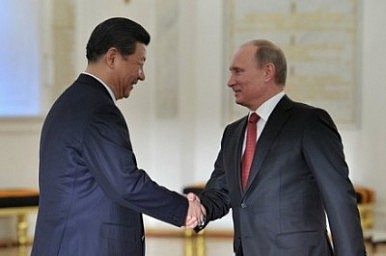Ukraine Crisis: Can China Be More Helpful?
China is uniquely positioned to offer some constructive diplomacy to resolve the impasse.
By Wei Zongyou
March 14, 2014

Though far away from China, and definitely not affecting China’s “core interests,” Ukraine crisis is increasingly placing China in a diplomatic dilemma. On the one hand, the crisis aggravated by the “peaceful entry” of Russian soldiers into Crimea and the latter’s plan to break away from Ukraine through a referendum is diametrically opposed to China’s long-held principle and position of non-interference and anti-separatism; on the other hand, if China sympathizes with Kiev’s new government or the West’s view of point, it will surely alienate Russia, with which China has forged close strategic relations in recent years. What’s more, as Russia and the United States are both wooing China for support and as the situation in Ukraine goes from bad to worse, how could China still stand on the fence while not alienating either and transgressing on its own long held principle?
In view of the delicacy of the situation and the inherent dilemma, China’s response, so far, has been very cautious and intentionally ambiguous. However, as the United States and Europe push for tougher measures and sanctions against Russia, and if Kiev decides to put its case before the UN Security Council, which would seem very likely, China’s diplomatic leeway will be increasingly squeezed. Beijing will have to make its position more clearly heard and play a more active role, as new Foreign Minister Wang Yi suggested at a People’s Congress press conference.
The good news is that there is still some room for diplomacy:
First, neither the West nor Russia wants war, even cold war. For a post-modern Europe, a war with a nuclear-armed Russia is unthinkable. Even a cold war of some form would be unbearably costly, if not an outright disaster, for the struggling European economy. Britain, France and Germany each have huge economic interests with Russia. The budget-constrained Obama administration, meanwhile, just doesn’t have the means or the will to wage or even imagine a small, conventional war with Russia. For Russia, although it is disillusioned with the West, it is not prepared physically or psychologically to have a war, hot or cold, with Western powers.
Second, the United States, Europe and Russia all want to find a reasonable way out of the current crisis, as of course does the Ukraine government. No doubt, Russia’s action in Crimea surprised both the U.S. and Europe, which find themselves pressed by world opinion to take firm action, even though they are not prepared and reluctant to do so. And while they push for some kind of economic sanctions against Russia, they still don’t want to shut the door of negotiation and push Moscow into corner. As for Russia, though it did expect some resentment and criticism from the West, it is not prepared to face the prospect of tough economic sanctions and political isolation. If offered a decent solution, Russia will not be foolhardy.
Third, an autonomous Crimea within Ukraine, within which Russia’s military presence can be guaranteed, is in the best interests of Ukraine, Russia and the international community. Under the current situation, what worries Kiev most is the possible loss of Crimea and the Russian threat to its territorial sovereignty and integrity. In its turn, Russia’s nightmare is a pro-West Ukraine, hostile to Russia and opposed to its military presence in Crimea. If each can get what it wants to and avoid what it fears, a solution may be found.
Given these common interests, China can play an active role in facilitating a diplomatic solution to the current crisis.
First, China could embark on a quiet diplomacy, taking advantage of its close strategic relations with Russia. At present, in the shadow of looming economic sanctions from the U.S and Europe, the chance of Russia backing down in bilateral or multilateral dialogues with the West is very slim. Russian President Vladimir Putin is not going to bow to the West because of sanctions. However, if China can quietly offer Russia a helping hand, talking from the perspective of a close friend of what is in Russia’s best interest concerning Ukraine, something Putin knows better than anybody else, the perhaps the Russian president will be more willing to listen. And Chinese President Xi Jinping can reciprocate Putin’s phone call and offer his advice as a friend.
Second, if Putin is interested in China’s advice, Beijing should seek Washington’s promise or even guarantee of the status of Russian military base in Crimea and the cancellation of economic sanctions.
Third, once a promise or even guarantee is secured, China should work together with Germany, whose position and attitudes are somewhat different from those of the United States and other European countries, to persuade Russia to de-escalate the situation and seek a diplomatic solution to the crisis.
Of course, if Russia is unwilling to take China’s advice as a friend, Beijing should also be straight with Moscow, telling it that China will not be comfortable with, let alone support, the cession of Ukraine territory, which would be contrary to China’ s long-held principle. And Beijing should also be frank in conveying that Russia cannot count on China’s vote if the case of Crimea’s independence or cession is put before the Security Council by the Ukraine government.
Wei Zongyou, is Professor and Vice Dean of Institute of International and Diplomatic Affairs, Shanghai International Studies University, Shanghai, China. His main research interests cover Sino-U.S. Relations, American Foreign Policy, Humanitarian Intervention and R2P. The views expressed here are solely those of the author in his private capacity and do not in any way represent the views of the institute, or any official institutions.
(来源:http://thediplomat.com/2014/03/ukraine-crisis-can-china-be-more-helpful/)





